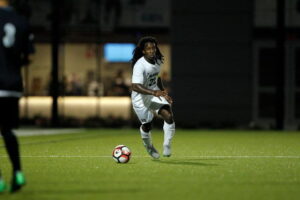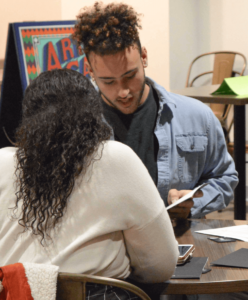Tag: inclusion
Nick Sailor ’17: Soccer, Diversity, Equity, and Inclusion
by The Cowl Editor on March 5, 2020
Athlete of the Week
Former Soccer Player Returns to Campus
by Jack Belanger ’21
Sports Coeditor
Nick Sailor ’17 can be associated with a lot of firsts since stepping onto campus back in 2013. He was the first male student to graduate as a women’s studies major, co-founded the Black Chalk Corps Council within Teach for America down in Baltimore, and was named Providence College’s first director of training and education for diversity, equity, and inclusion back in October, a new position created by the Office of Institutional Diversity, Equity and Inclusion and the athletics department to help promote these ideals within athletics but across campus.
And ironically, had another school not been recruiting him to play soccer, Sailor may not have found the College at all.

Sailor and his father came to Providence to meet with a coach who worked at a different school within the city. The two arrived early and Sailor’s father suggested they visit PC to kill some time. Immediately, Sailor fell in love with the campus, though it was not until later in his recruitment process that he got the chance to consider PC.
“As the [recruiting] process got going they reached out to me, because they were interested in me as a soccer player,” Sailor said. “And I told them ‘I actually really liked this school from a while ago.’ It all came together where I fell in love with the school first then the soccer part came second.”
For the next four years, Sailor showed what it meant to be true student-athlete, finding great success on and off the field. He played four seasons for the men’s soccer team and was named co-captain during his senior year. While he only scored three goals in his career, it was the last one that came at one of the most important moments in the program’s history. It was the second round of the NCAA tournament against the undefeated University of Maryland where the Friars found themselves down 2-4 with just over 20 minutes left in the game.
After the Friars forced a turnover and went on the attack, Sailor found himself with the ball outside the box and ripped a shot from the right that was just out of the Terrapin goalie’s reach. The goal closed the gap 4-3 and helped fuel the Friars’ comeback. They eventually upset Maryland 5-4. Sailor admitted that it was not until after the game was won that he was able to appreciate the goal.
“If I took a second to think about how crazy the goal was, I think I would have been out of order,” Sailor explained. “So, all I was thinking was, ‘This can’t be my last game,’ and I was focused on what I could do next to keep things going.”
While Sailor played on some successful teams, what he took away most from his time on the team was the brotherhood they built and connections he continues to keep with former teammates and former coaches.
For as much of an impact he made on the field, Sailor made just as much of one off of it. He served as the President of Student-Athlete Advisory Council, a Friar Foundation mentor, and sang with the Footprints Gospel Choir. Rather than focusing his studies in one area, Sailor double-majored in sociology and women’s studies, while also minoring in black studies, fitting for someone who has spent his time after graduating focused on empowering others and striving for inclusivity everywhere he goes.
Upon graduation, Sailor joined Teach for America and moved to Baltimore, where he became a special education math teacher at Walter P. Carter Elementary & Middle School. Not only did he help shape young students, Sailor worked on supporting black educators in the Baltimore area.
“It was a good time for me to be there after graduating. It was good to go to a new place and while it was challenging at times, I was surrounded by many talented young black entrepreneurs and learned from them to grow as a young professional.”
In Baltimore, Sailor helped co-found the Black Chalk Corps Council, a group within the Baltimore corps that strived not only to help empower black educators within the classroom but also outside in the community. He pointed out that data shows that black educators go through challenges on a day-to-day basis that other groups do not experience, such as having to be a disciplinarian. Sailor stressed that it is important to support black educators since they only make up 10 percent of all educators, yet they have a great value in public schools.
“The Council gave us the support to help black teachers flourish which, in turn, allows for our students to flourish. And overall that was our goal: to see our students be successful.”
After two years in Baltimore, Sailor received a call from PC about a new position that focused on diversity in athletics. It seemed like a perfect fit for him after showing passion in promoting diversity during his time in school. Eventually it was announced on Oct. 25 that Sailor would become the College’s first-ever director of training and education for diversity, equity and inclusion, a position that is not very common in colleges across the country.
Since it is such a new position, Sailor says most of his day-to-day work involves what he calls “infrastructure building.” Not only does he plan for what the next year will look like, but also set the stage for the position years down the road. While having no predecessor has its challenges, Sailor enjoys how much freedom he has to shape the job to fit the needs and culture of PC.
One of his biggest goals in his new role is to push the value of student-athletes’ mental health, something that he brought up during his time as a student-athlete. He also wants to connect with the entire athletic department and push the ideals he has been promoting since day one.
“For me, I want to bring the value of inclusion, diversity, and equity and show how it can be valuable to the different facets of the athletic department.”
One of the initiatives Sailor has already created is called “Wisdom Over Waffles.” The monthly event gathers the athletic staff into one room to discuss topics of diversity and inclusion in how it relates to sports over chicken and waffles. Sailor is focused on creating consistent events that continue the conversation of diversity rather than just one-time events such as bringing in speakers. He has given presentations to different teams while trying to connect to students as much as he can.
Looking back on his time as a student, Sailor believed the two things that have helped shape his career has been discipline and commitment. When it came to teaching, he believed in the idea of being a light for others and doing everything he had to support students.
“No one had to convince me to work hard. No one had to convince me to get up early and prepare. I knew if I had the passion in something, I could give it everything I had.”
This drive and passion that has led Sailor to create change everywhere he has gone. He has been given the tools to have an influential impact at PC for years to come.
Working Towards PC Equality: IDEI Department Establishes Student Representative Groups
by The Cowl Editor on December 5, 2019
Campus

by Hannah Langley ’21
News Co-Editor
For several years now, Providence College administration, students, and faculty have been working towards creating a PC200 plan that includes many initiatives, such as the promotion of more diversity and inclusion on campus. Recently, the office of Institutional Diversity, Equity and Inclusion (IDEI) at PC has established two student groups to help the College fulfill this goal.
These two groups, the Advocates of a Beloved Community (ABC) and the Student Diversity Advisory Council (SDAC), are both comprised of around a dozen students, each representing a different student organization or club on campus.
According to a formal document from Quincy Bevely, assistant vice president of institutional diversity, the “Advocates” and council members “will be trained in areas related to cross-cultural understanding, micro-macro aggressions, restorative practices, and conflict resolution.”
Furthermore, ABC will provide the PC community with events that will promote further awareness about bias and hate, giving students, faculty, and staff the opportunity to, according to the same document, “engage in anti-bias education, advocacy, and solidarity.”
As previously mentioned, multiple students were chosen for each of the groups, representing various PC clubs and organizations, including Student Congress, Board of Programmers (BOP), Friars Club, Board of Multicultural Student Affairs (BMSA), Organization of Latin American Students (OLAS), Stopping Homophobia, Eliminating Prejudice and Restoring Dignity (SHEPARD), Campus Ministry, Orientation Leaders (OL), Residence Assistants (RA), Peer Mentoring Program (PMP), Horizons, Providence Immigration Rights Coalition (PIRC), Brotherhood, NAACP, ALPHA, ESports, The Cowl, and Believers of Word (BOW).
Jacqueline Peterson, special advisor to the president, talked about her role in the IDEI department and her part in creating these groups. “The priority goal,” she said, “has been to implement a structure and collaborative partnerships on campus to identify the strategic direction for the College’s DEI initiative.” Her role in this is to provide leadership to not only the student groups, but also to the educators and faculty in the IDEI department.
The purpose of SDAC, Peterson said, is to “empower students to lead and promote a campus environment that is committed to equity, social justice, and inclusive excellence.” ABC’s role is to “develop appropriate educational, supportive, and restorative strategies to address campus climate issues that may arise in the wake of bias-related incidents and prevent further occurrences.”
Along with Bevely and Peterson, Nick Sailor ’17, the director of training and education for IDEI, and Kalan Lewis, a current graduate assistant, have had an integral part in making these two student groups and continuing to work with them and the PC community to promote diversity and inclusion.
Earlier this year, Bevely selected students to represent each of these organizations. Acklynn Byamugisha ’20, advocate for BMSA, talked about the selection, saying, “I was chosen by Quincy [Bevely] and I was more than thrilled to take on the position.” Both Byamugisha and Elizabeth Duffy ’23, advocate for Campus Ministry, talked about how their roles will be in building more respect around campus, creating a greater cultural awareness, and highlighting differences across cultures. Byamugisha talked more about this, saying, “Multiculturalism goes beyond race [and] what the eyes are able to see.”
Duffy is hopeful that the group will be able to cultivate awareness and change on campus, saying, “I feel like there is always room to grow in becoming a close-knit community of friends, and I’m hopeful that this newfound deeper sense of family and love will radiate into the world when students graduate.”
Ricardo Guzman ’20, representative for the SDAC and president of SHEPARD, talked about how their group is also going to promote equality and awareness, saying they plan on having meetings starting next semester to hear more about what various clubs and organizations have planned for promoting diversity and change. “It is one thing to work with the student body,” said Guzman, “but through this group we hope to create institutional change.”
On Nov. 13, both groups met in Moore Hall to begin training with Diane Goodman, who has devoted her life to training, consulting, teaching, speaking, and writing about diversity and social justice. Goodman came to PC’s campus to meet with the students from both of these groups in order to prepare them in their roles and for their lives in the future, as well.
Both groups will be beginning work next semester, and Bevely is excited for what is to come.
